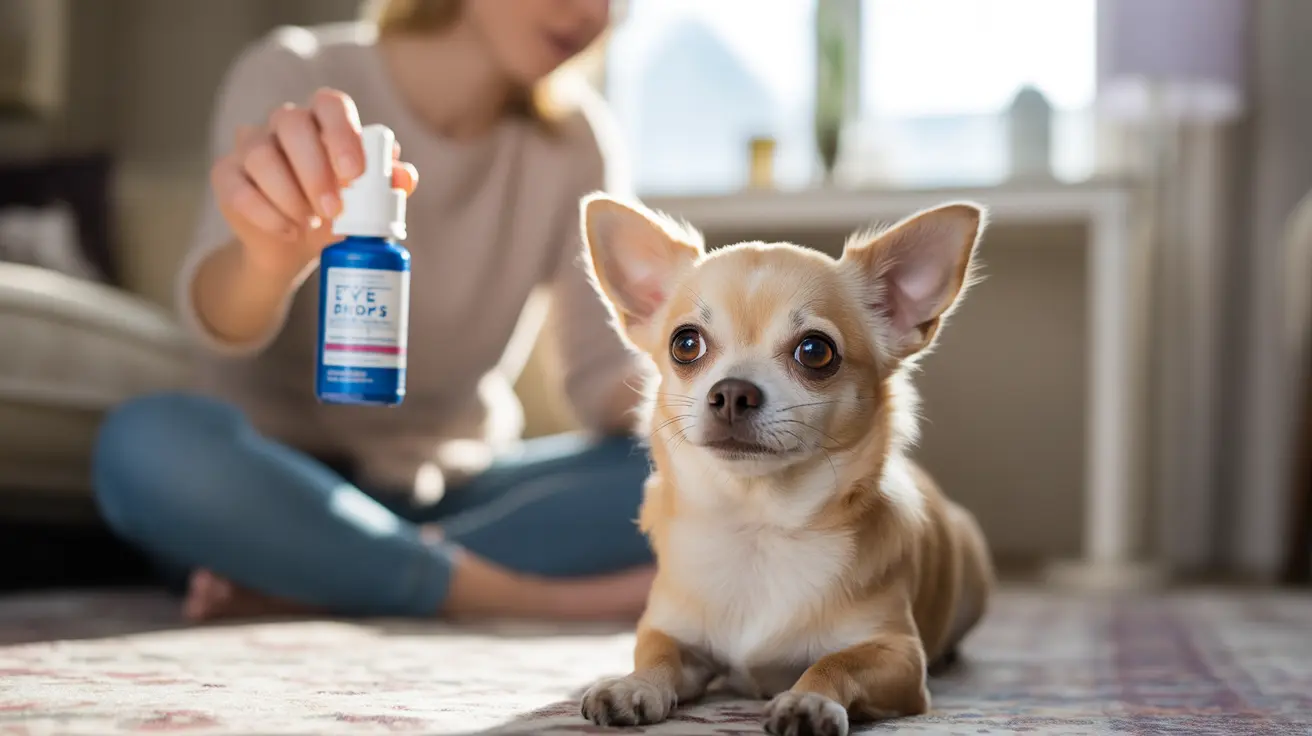Many pet owners wonder if they can use human eye drops on dogs when their furry friends experience eye problems. While it's tempting to reach for over-the-counter eye medications meant for humans, doing so can be dangerous and potentially harmful to your dog's health.
In this comprehensive guide, we'll explore why human eye drops aren't safe for dogs, what alternatives are available, and when to seek veterinary care for your pet's eye concerns.
Why Human Eye Drops Are Dangerous for Dogs
Dogs have different eye anatomy and physiology compared to humans, making human eye drops potentially hazardous. Their tear ducts, third eyelid, and corneal sensitivity differ significantly from ours, affecting how medications are absorbed and processed.
Common human eye drops like Visine contain vasoconstrictors that can be toxic to dogs, potentially causing serious cardiovascular and neurological problems if absorbed or ingested. Even seemingly harmless preservatives in human eye drops can damage your dog's delicate eye tissues.
Safe Alternatives for Dog Eye Care
While most human eye drops are unsafe for dogs, there are some limited exceptions that may be used with veterinary approval:
- Sterile saline solution for gentle eye rinsing
- Artificial tears (without medications) for temporary lubrication
- Veterinary-prescribed eye medications specifically formulated for dogs
Always consult your veterinarian before using any eye products on your dog, even those marketed as "natural" or "gentle."
When to Seek Immediate Veterinary Care
Certain eye symptoms require prompt professional attention. Contact your veterinarian immediately if your dog shows:
- Squinting or excessive blinking
- Pawing at the eyes
- Visible redness or swelling
- Cloudy appearance in the eye
- Colored or bloody discharge
- Changes in vision or behavior
Common Dog Eye Conditions and Their Treatment
Different eye conditions require specific treatments prescribed by a veterinarian:
Allergic Conjunctivitis
Requires veterinary-approved antihistamine or anti-inflammatory drops, not human allergy medications.
Dry Eye (KCS)
Needs specialized treatment with prescription lubricants and possibly immunomodulatory medications.
Infections and Inflammation
Must be treated with appropriate antibiotics or anti-inflammatory medications selected by your vet.
First Aid Tips for Dog Eye Care
While waiting for veterinary care, you can:
- Use a clean, damp cloth to gently wipe away discharge
- Prevent your dog from scratching or rubbing the affected eye
- Keep the area around the eye clean
- Use an Elizabethan collar if necessary to prevent self-trauma
Frequently Asked Questions
Can I safely use human eye drops like Visine on my dog's eyes?
No, human eye drops like Visine are not safe for dogs. They contain ingredients that can be toxic to dogs and may mask serious underlying conditions.
What are the risks of using human eye drops on dogs without veterinary advice?
Risks include toxic reactions, masking serious conditions, worsening infections, and potential damage to the eye's delicate structures. Some ingredients can cause systemic problems if absorbed.
Which human eye drops, if any, are safe to use on dogs in an emergency?
Only sterile saline solution or artificial tears (without medications) may be used temporarily, and only with veterinary approval. All other eye drops should be prescribed by a veterinarian.
How should I treat my dog's red, itchy, or watery eyes before seeing a vet?
Keep the eye area clean with a warm, damp cloth. Avoid any over-the-counter medications and seek veterinary care, especially if symptoms persist or worsen.
Why do vets recommend prescription eye drops over human OTC drops for dogs' eye problems?
Veterinary prescriptions are specifically formulated for dogs' unique eye anatomy and chemistry, ensuring proper dosing and reducing risks of adverse reactions or complications.
Conclusion
When it comes to your dog's eye health, it's crucial to avoid using human eye drops and instead seek proper veterinary care. While some simple saline solutions might be safe for temporary use, any persistent eye problems require professional diagnosis and treatment to ensure your pet's vision and well-being.






